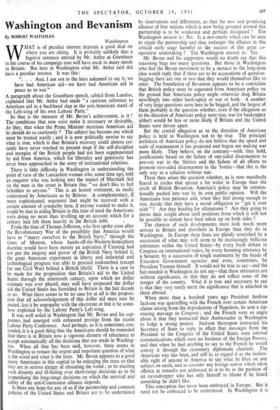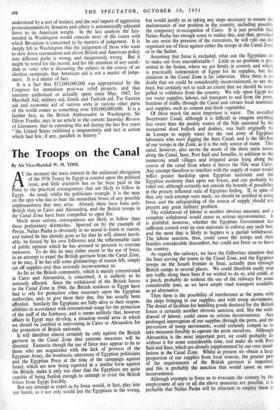Washington and Bevanism
By ROBERT WAITHMAN Washington WHAT is of peculiar interest depends a good deal on where you are sitting. It is probably unlikely that a fugitive sentence uttered by Mr. Attlee at Grantham in the course of his campaign tour will have stuck in many minds in Britain. But here in Washington what Mr. Attlee said did have a peculiar interest. It was this: ". . . And, I am not in the least ashamed to say it, we have had American aid—we have had American aid in peace as in war."
A paragraph about the Grantham speech, cabled from London, explained that Mr. Attlee had made " a cautious reference to American aid in a backhand slap at the anti-American stand of the Left-wing of his own Labour Party."
So that is the measure of Mr. Bevan's achievement, is it ? The conditions that now exist make it necessary or desirable, do they, that when the Prime Minister mentions American aid he should do so cautiously ? The subject has become one which must be treated warily ; and it is now politically unwise to say what is true, which is that Britain's recovery could almost cer- tainly have never reached its present stage if the self-discipline and energies of the British people had not been supplemented by aid from America, which for liberality and generosity has never been approached in the story of international relations.
There is little difficulty in Washington in understanding the point of view of the Lancashire woman who, some time ago, told an enquirer who was looking into the impact of Marshall Aid on the man in the street in Britain that " we don't like to feel beholden to anyone." This is an honest sentiment, as easily understood by Americans as by Britons. A complementary, if more sophisticated, argument that might be received with a certain amount of sympathy here, if anyone wanted to make it, would be that in aiding Britain in this time of-need the Americans were doing no more than levelling up an account which for a century had left them heavily in the British debt. . From the time of Thomas Jefferson, who first spoke soon after the Revolutionary War of the possibility that America would have to " marry ourselves to the British Navy," through the times of Monroe, whose hands-off-the-Western-hemisphere doctrine would have been merely an aspiration if Canning had not put the majesty and power of the British Navy behind it, the great American experiment in liberty and industrial and technological progress was able to proceed undisturbed (except for one Civil War) behind a British 'shield. There is a case to be made for the proposition that Britain's aid to the United States through the nineteenth century, upon which no dollar estimate was ever placed, may well have surpassed the dollar aid the United States has furnished to Britain in the last decade or so. What there seems to be no case for at all is the proposi- tion that all acknowledgement of ithis dollar aid must now be muted, lest it be unpopular with the electorate or lest it be some- how exploited by the Labour Party's Left-wing.
It was well noted in Washington that Mr. Bevan and his sup- porters .had emerged with enhanced prestige from the recent Labour Party Conference. And perhaps, as it is sometimes con- tended, it is a good thing that the Americans should be reminded that there is in Britain now a vigorous element of reluctance to accept automatically all the decisions that are made in Washing- ton. When all that has been said, however, there seems in Washington to remain the urgent and important question of what is the wood and what is the trees. Mr. Bevan appears to a good many Americans in this capital to be enlarging the trees so-that they are in serious danger of obscuring the wood ; to be exciting such disunity and ill-feeling over short-range decisions as to be jeopardising the long-range decisions on which the survival and safety of the anti-Communist alliance depends. Is there any hope for any of us if the partnership and common policies of the United States and Britain are to be undermined by reservations and differences, so that the new and promising alliance of free nations which is now being grouped around this partnership is to be weakened and perhaps dissipated ? The Washington answer is : No. Is a movement which can be seen to strain the partnership and thus endanger the alliance in this critical early stage harmful to the success of this great co- -operative undertaking ? The Washington answer is : Yes.
Mr. Bevan and his supporters would no doubt say that this reasoning begs too many questions. But those in Washington who feel the Bevan movement to be a menace to the long-term idea would reply that if there are to be accusations of question- begging there are one or two that they would themselves like to enter. The foundation of Bevanism appears to be a conviction that British policy must be separated from American policy on the ground that American policy might otherwise drag Britain unwillingly into either bankruptcy or war or both. A number of very large questions seem here to be begged, and the largest of them probably is the question whether, even if the allegation as to the direction of American policy were true, war (or bankruptcy either) would be less or more likely if Britain and the United States were driven apart.
But the central allegation as to the direction of American policy is held in Washington not to be true. The principal architects of American policy do not believe that the speed and scale of rearmament it has projected and begun are making war more likely. They believe, on the contrary—with, they hold, justifications based on the failure of one-sided disarmament to prevent war in the 'thirties and the failure of all efforts to promote two-sided disarmament in the 'forties—that this is the only way to a solution without war.
There then arises the question whether, as is now manifestly feared in circles that spread a lot wider in Europe than the circle of British Bevanism, America's policy may be uninten- tionally pushed into war by its own public opinion. Will the Americans lose patience and, when they feel strong enough to win, decide that they have a moral obligation to " get it over with " ? Are they heading for ultimatums ? Are they going to throw their weight about until positions from which it will not be possible to retreat have been taken up on both sides ?
The chances of such developments must look much more serious in Britain and elsewhere in Europe than they do in Washington. In Europe these fears are plainly nourished by a succession of what may well seem to be increasingly bellicose utterances within the United States—by every fresh debate in Congress on international topics, by every booming utterance by a Senator, by a succession of tough statements by the heads of Executive Government agencies and even, sometimes, by President Truman himself. It would not be true to say—and the fair-minded in Washington do not say—that these utterances are without significance, or that they do not reflect some of the temper of the country. What it is true and necessary to say is that they very rarely merit the significance that is attached to them abroad.
When more than a hundred years ago President Andrew Jackson was quarrelling with the French over certain American claims arising from the depredations of Napoleon, he sent a rip- roaring message to Congress ; and the French were so angry about it that they instructed their Ambassador in Washington to lodge a strong protest. Jackson thereupon instructed his Secretary of State to reply in effect that messages from the President to the Congress of the United States were internal communications which were no business of the foreign Powers, and that when he had anything to say to the French he would convey it through the customary diplomatic channels. The American way has been, and still is, to regard it as the inalien- able right of anyone in America to say what he likes on any subject on earth, and to consider any foreign nation which takes offence at remarks not addressed to it to be in the position of an eavesdropper who has only himself to blame if he heard something he didn't like. This conception has never been embraced in Europe. But it need not be embraced to be understood. In Washington it is understood by a sort of instinct, and the real import of aggressive pronouncements by Senators and others is automatically adjusted down to its American weight. In the last analysis the fair- minded in Washington would concede most of the issues with which Bevanism is concerned to be matters of judgement. It is deeply felt in Washington that the judgement of those who want to slow down rearmament and divert British and American policy into different paths is wrong, and dangerously wrong. But it might be noted for the record, and for the attention of any candi- date or voter who is discussing the subject in the course of an election campaign, that American aid is not a matter of judge- ment. It is a matter of fact.
It is a fact that $12,000,000,000 was appropriated by the Congress for immediate post-war 'relief projects, and that amounts authorised or actually spent since May, 1947, for Marshall Aid, military aid, Greek and Turkish aid, Far Eastern aid and economic aid of various sorts in various other parts of the world comes to something over $30,000,000,000. It is a further fact, as the British Ambassador in Washington, Sir Oliver Franks, says in an article in the current Saturday Review of Literature, that in extending this aid during the last five years " the United States exhibited a magnanimity and tact in action which had few, if any, parallels in history."



































 Previous page
Previous page